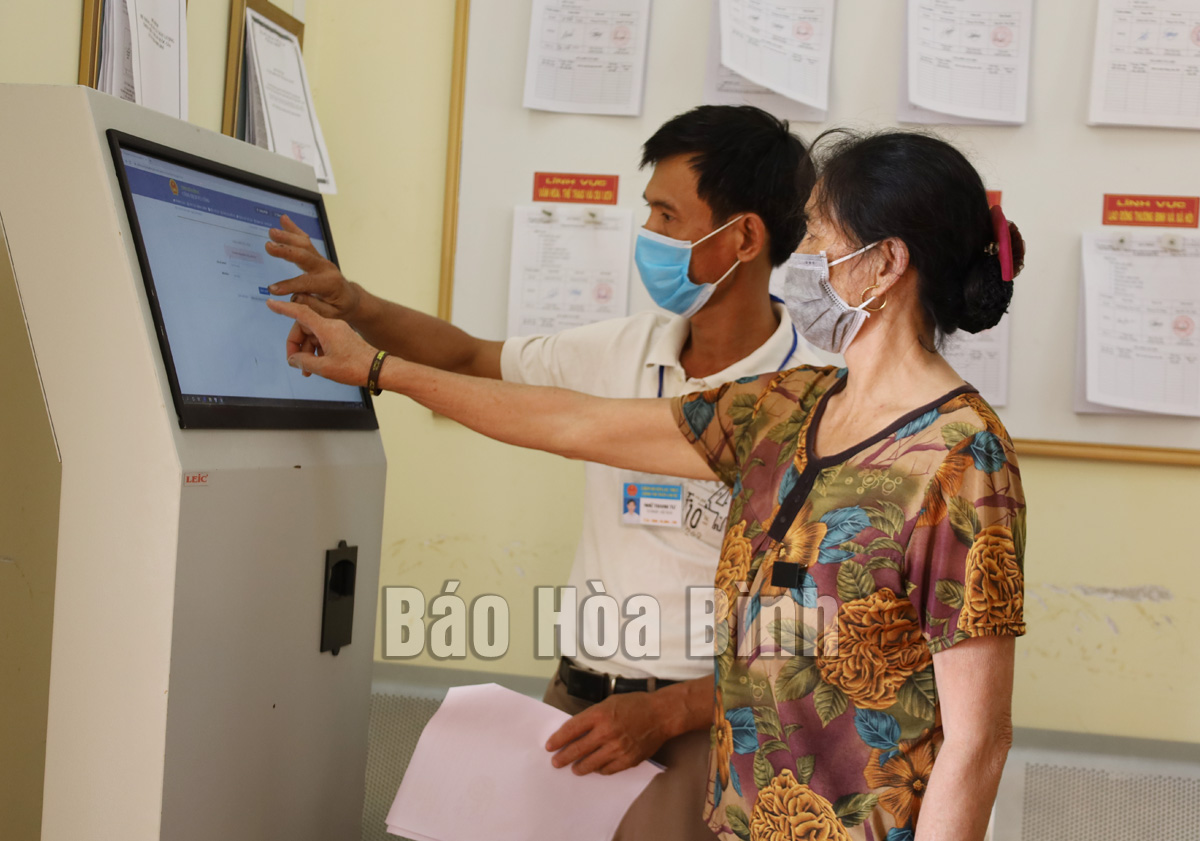
(HBO) – The unit in charge of handling administrative procedures at the People’s Committee of Chi Ne township, Lac Thuy commune has been fully-equipped to serve the public. The handling of administrative procedures has improved considerably.
A "one-stop shop” officer instructs a citizen how to use public services online.
Instead of coming to the unit's office, Pham Thi Thuan from Ngai Long village is able to use computer at home or mobile phone to send documents online. She later could track how her documents are processed. With the service, she saw many benefits, including saving time and travelling effort.
Apart from online public services, the unit also receives and sends documents in the traditional "one-stop shop” method. Residents are satisfied with professionalism and service of officers there. Almost administrative procedures are handled without appointment notes, mostly in judicial and civil affairs. Each year, there are not overdue documents while the collection of costs and fees is ensured. At the unit, the list of administrative procedures and hotlines of departments and agencies are publicised. Residents could also check them online.
Chairman of the township People’s Committee Nguyen Van Ngoc said this year, the district assigned the unit to increase local participation in online public services to 51 percent, but the rate amounted to 66 percent in eight months of this year. It was one of the important results in administrative reform. Apart from improving infrastructure, the unit also devised its annual administrative reform scheme and popularised services level 3 and 4 to departments, agencies, mass organisations, officials and cadres. It also streamlined its staff and issued working regulations to ensure they could bring into full play their expertise in suitable areas.
During 2020-2021, the township will popularise the benefits of online public services at levels 3 and 4 via conferences and meetings of departments, agencies, mass organisations and residential areas, thus helping residents access them via computers or smart phones, towards forming "digital citizenship”. The launch of online public services level 3 and 4 not only makes it convenient for organisations and individuals to deal with their work but also ensures the continuous and smooth operation of State agencies amid the pandemic at present. At the same time, discipline and working style of civil servants also improved, contributing to building a modern administrative sector for the public./.
In the spirit of "Party members go first, the people follow”, all households of Party members in the Doan Ket sub-region in Da Bac town, Da Bac district, voluntarily removed gates and fences, and donated land when the road expansion project passed through their properties. Inspired by their example, 68 households in the sub-region quickly followed suit, contributing over 1,400 sq.m of residential and perennial cropland to widen the main road through the residential area. The exemplary role of Party members in Doan Ket stands as a shining example of studying and following President Ho Chi Minh’s thought, morality, and lifestyle.
The Hoa Binh provincial People's Committee held a monthly meeting on May 29 to assess the implementation of socio-economic development tasks in the first six months of 2025, the progress of key projects, and some other important issues.
During his lifetime, President Ho Chi Minh always expressed his deep affection and special concern for children and youth. He once emphasized: "Caring for and educating children well is the responsibility of the entire Party and the entire people”; "First of all, the family (i.e. grandparents, parents, siblings) must do this job well”. "the Party Committees…, the Children’s Committee, the Youth Union, the education sector, and all related organizations must have specific plans to ensure children grow healthier and more progressive”. His teachings has been remaining valuable and serving as the guiding principles in the work of protecting, caring for, and educating children. In line with this ideology, Hoa Binh Province has continuously been prioritizing and investing resources in the well-being of children in recent years.
Mr. Nguyen Phi Long, the alternate Member of the Party Central Committee and Secretary of the Provincial Party Committee chaired the meeting of the Standing Committee of the Provincial Party Committee to provide opinions on several investment projects within the province. There was the attendance of Ms. Bui Thi Minh, the Permanent Deputy Secretary of the Provincial Party Committee and Chairwoman of the Provincial People’s Council; Mr. Bui Đuc Hinh, the Deputy Secretary of the Provincial Party Committee and Chairman of the Provincial People’s Committee and other members of the Standing Committee; the leaders from other departments, agencies, and some localities.
The Standing Board of the Vietnam Fatherland Front (VFF) Committee of Hoa Binh province held a meeting on May 28 to honour outstanding village elders, village heads, and reputable individuals from local ethnic minority and religious communities.
In mid-May, the provincial Museum organised an exhibition named "Duoi la co Dang Cong san Viet Nam quang vinh” (Under the flag of the glorious Communist Party of Vietnam). This meaningful activity took place in the joyful atmosphere to celebrate the country's major holidays and the Party congresses at all levels for the 2025-2030 term, towards the 14th National Party Congress.



